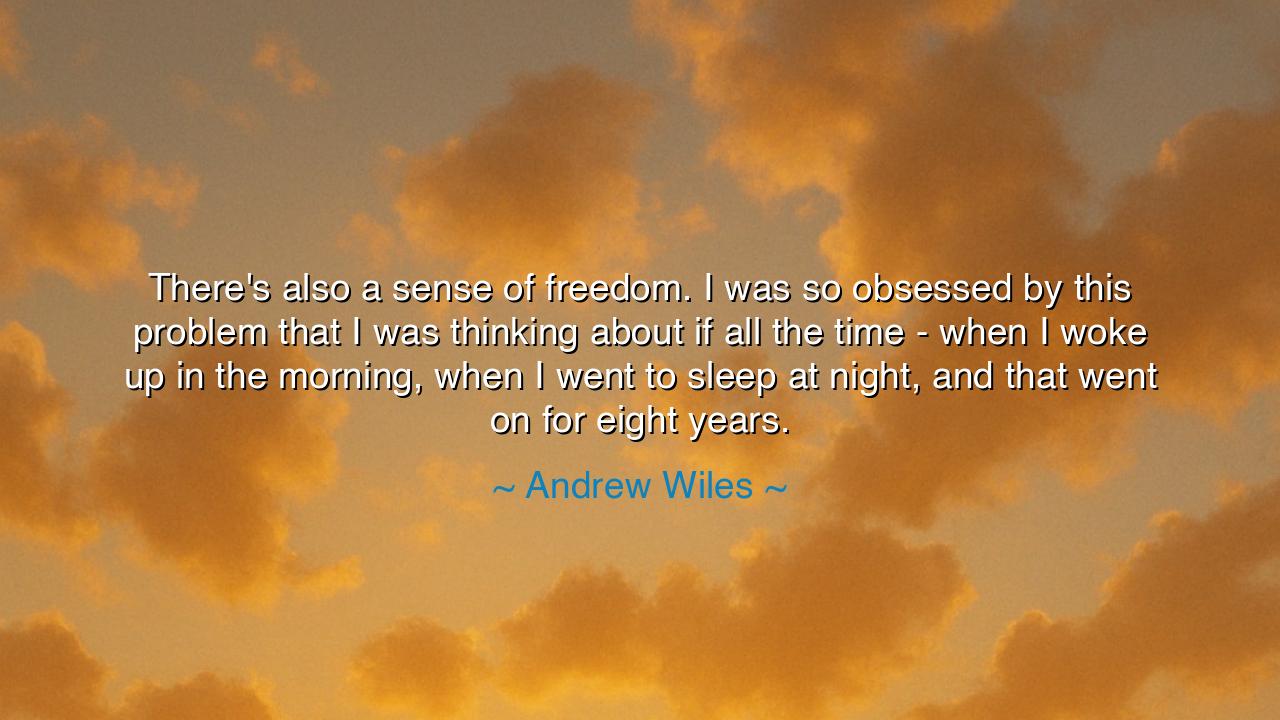
There's also a sense of freedom. I was so obsessed by this
There's also a sense of freedom. I was so obsessed by this problem that I was thinking about if all the time - when I woke up in the morning, when I went to sleep at night, and that went on for eight years.






“There’s also a sense of freedom. I was so obsessed by this problem that I was thinking about it all the time—when I woke up in the morning, when I went to sleep at night, and that went on for eight years.” Thus spoke Andrew Wiles, the mathematician who at last solved Fermat’s Last Theorem, a riddle that had tormented the minds of the greatest thinkers for more than three centuries. His words, though calm in tone, blaze with the fire of devotion, sacrifice, and triumph. In them we hear the paradox of true passion: that what enslaves the mind also sets it free, that what consumes the heart also nourishes it, and that the weight of obsession can, in truth, become the wings of liberation.
The origin of this saying lies in Wiles’ secret labor. As a boy he discovered Fermat’s Last Theorem—a deceptively simple claim scribbled in the margin of a book by Pierre de Fermat in 1637, which had resisted proof for centuries. Wiles, struck by its mystery, carried it in his heart until the day came when he resolved to dedicate his life to solving it. For eight long years he worked in secrecy, enduring countless frustrations, failures, and false starts. Each morning he woke with the problem upon him, and each night he carried it to bed. And yet, he did not despair—for within this burden there was a sense of freedom, the freedom that comes when a man surrenders fully to his calling.
The ancients knew of this paradox. Did not Archimedes leap from his bath crying “Eureka!” after long nights of thought, consumed by a single idea? Did not Demosthenes, the orator of Athens, practice speeches in the roar of the sea until his obsession with eloquence became his liberation? For when one binds oneself utterly to a purpose, the chains of distraction fall away, and the soul becomes singular, sharp, like a blade honed to a single point. Obsession, when true, is not imprisonment—it is destiny.
History too gives witness. Consider Marie Curie, who labored with her husband Pierre in a drafty shed, stirring pitchblende with her own hands, seeking the faint glimmer of radioactivity. She lived in poverty, endured exhaustion, suffered ridicule—and yet, she was free. For she had found her obsession, and through it she opened new worlds of science. Like Wiles, she bore the weight of her problem not as a curse but as a crown. Such is the fate of those who live for something greater than comfort: they are bound and free at once.
The lesson for us is clear. When you find the work that grips you so tightly it follows you to sleep and greets you at dawn, do not flee from it. Embrace it. For such obsessions are rare, and they reveal the path of your true calling. To be consumed by a purpose is not weakness but strength. The world may see only toil and sacrifice, but within, you will feel the freedom of living fully, of pouring every ounce of your being into the fire of creation. To give yourself wholly is to become whole.
Yet beware: not every obsession is noble. Some consume without creating, enslave without liberating. The true test is this—does the fire within you bring light to others? Wiles’ obsession gave the world a solution to a centuries-old riddle; Curie’s obsession gave new science to humanity; Mandela’s obsession gave freedom to his people. When your obsession carries within it a gift for the world, then it is not madness, but greatness.
So remember Wiles’ words: “There’s also a sense of freedom.” They teach us that freedom is not always found in leisure or in ease, but often in labor and in burden. When you give yourself fully to your highest work, when you endure the long years of trial, when you surrender to the problem that will not leave you—then, in that very surrender, you shall find your wings. For the greatest freedom is to live as one with your purpose, and to let that purpose carry you beyond the limits of time, toil, and fear.






AAdministratorAdministrator
Welcome, honored guests. Please leave a comment, we will respond soon